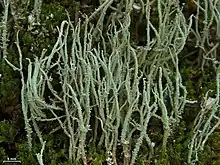| Cladonia subradiata | |
|---|---|
 | |
| Scientific classification | |
| Domain: | Eukaryota |
| Kingdom: | Fungi |
| Division: | Ascomycota |
| Class: | Lecanoromycetes |
| Order: | Lecanorales |
| Family: | Cladoniaceae |
| Genus: | Cladonia |
| Species: | C. subradiata |
| Binomial name | |
| Cladonia subradiata (Vain.) Sandst. (1922) | |
| Synonyms[1] | |
| |
Cladonia subradiata is a widely distributed species of fruticose lichen in the family Cladoniaceae. It is found in Asia, Africa, Melanesia, Australia, New Zealand, and South, Central, and North America.
Taxonomy
The lichen was originally described as a variety of Cladonia fimbriata by Finnish lichenologist Edvard August Vainio in 1894. The type specimen, collected in 1885, was found in Minas Gerais, Brazil, in the Caraça Mountains, at an elevation of 1,400 m (4,600 ft).[2] German botanist Heinrich Sandstede promoted it to distinct species status in 1922.[3]
Description
Cladonia subradiata has a scaly primary thallus that is small and stands erect. The podetia are whitish, measuring 1–2 cm (0.4–0.8 in) long, abundantly brown, rarely branched, acute or forming, tiny cups, with small scales, especially at the base. Apothecia are scarce; when present, they are reddish or brown, and spherical.[4] In terms of lichen spot tests, Cladonia subradiata is PD+ red and K−. It contains the lichen substances protocetraric acid, fumarprotocetraric acid, ursolic acid, and the chemically uncharacterized compounds called Cph-1 and Cph-2.[5]
Cladonia subradiata has been confused with Cladonia balfourii;[4] these species can be separated by chemistry.[6] According to Index Fungorum, however, these species are synonymous.[1]
Habitat and distribution
This species is widely distributed in Central and South America, extending to North Carolina in North America. In South America the lichen has been collected from Brazil, Chile, Argentina, Paraguay,[4] and Guyana.[7] It has also been recorded from Asia, Africa, Papua New Guinea, New Caledonia, Australia, and New Zealand. Cladonia subradiata grows in primary montane rainforests, preferring substrates such as humus and boulders.[5]
See also
References
- 1 2 "Synonymy: Cladonia subradiata (Vain.) Sandst". Species Fungorum. Retrieved 7 September 2020.
- ↑ Vainio, E.A. (1894). Monographia Cladoniarum universalis. Pars II. Acta Societatis pro Fauna et Flora Fennica (in Latin). Vol. 10. p. 338.
- ↑ Sandstede, H. (1922). "Flechten des nordwestdeutschen Tieflandes und der deutschen Nordseeinseln". Abhandlungen des Naturwissenschaftlichen Vereins zu Bremen (in German). 25 (2): 224–248.
- 1 2 3 Ferraro, L.I.; Ahti, T. (1987). "Contribucion al conocimiento del genero Cladonia (Cladoniaceae-liquenes) de Argentina y regiones limitrofes". Bonplandia (in Spanish). 6 (1): 57–69. doi:10.30972/bon.611505.
- 1 2 Stenroos, Soili (1988). "The family Cladoniaceae in Melanesia. 3. Cladonia sections Helopodium, Perviae and Cladonia". Annales Botanici Fennici. 25 (2): 117–148. JSTOR 23725717.
- ↑ Ahti, T.; Kashiwadani, H. (1984). "The Lichen genera Cladia, Cladina and Cladonia in southern Chile". In Inoue, Inoue (ed.). Studies on cryptogams in southern Chile. Tokyo: Kenseisha. pp. 125–149. ISBN 978-4-905869-19-1.
- ↑ Cornelissen, J.C.H.; Ter Steege, H. (1989). "Distribution and ecology of epiphytic bryophytes and lichens in dry evergreen forest of Guyana". Journal of Tropical Ecology. 5 (2): 131–150. doi:10.1017/S0266467400003400. JSTOR 2559543.